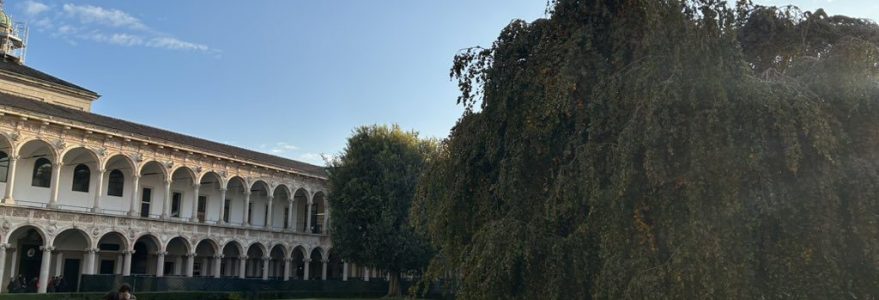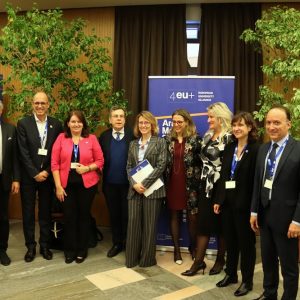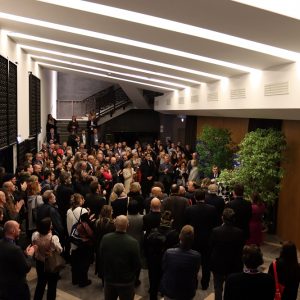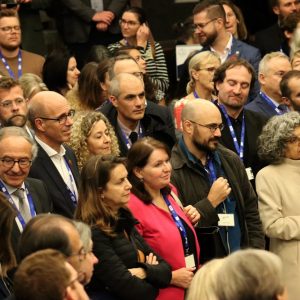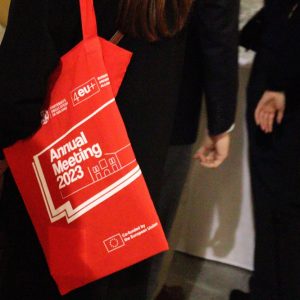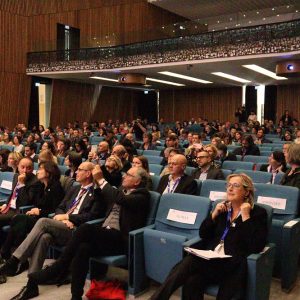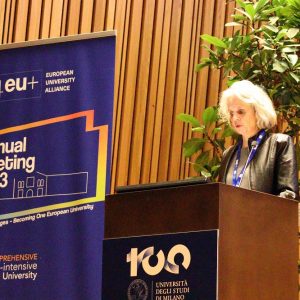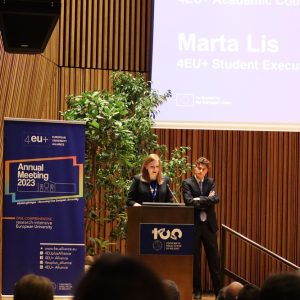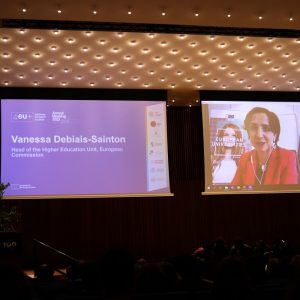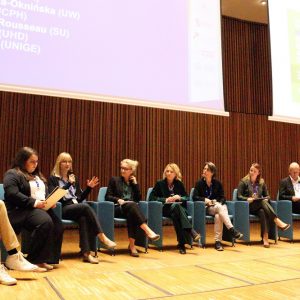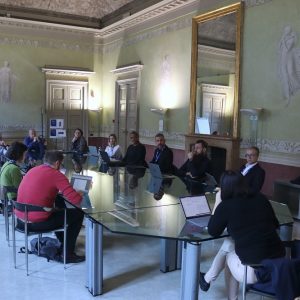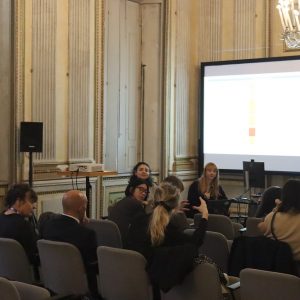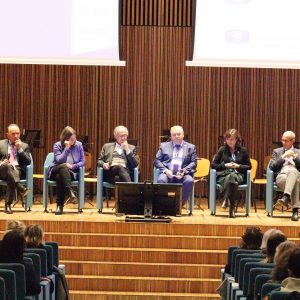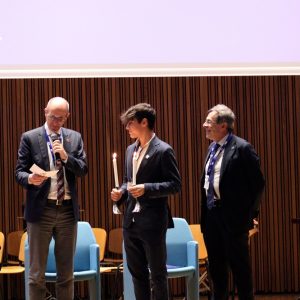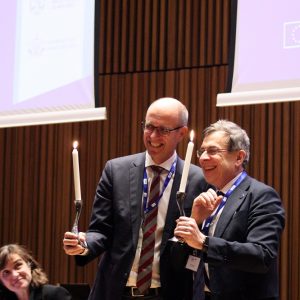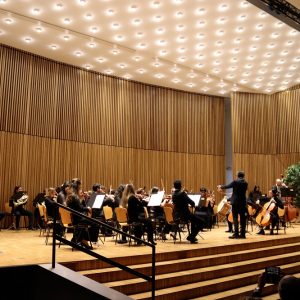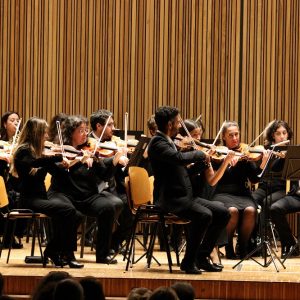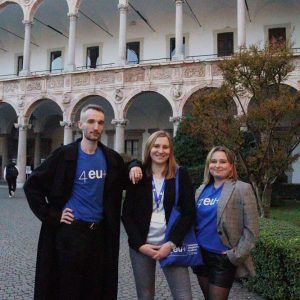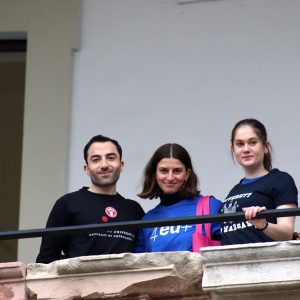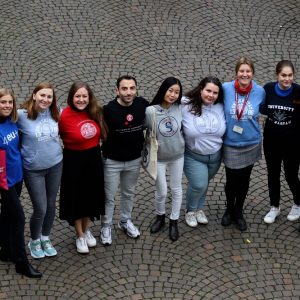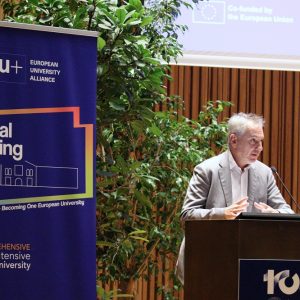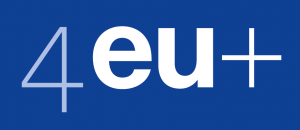“Building bridges – becoming one European University”. This was the motto of this year’s meeting of representatives of the eight member universities of the 4EU+ Alliance. The event, organised at the University of Milan, was attended by around thirty people from the UW.
The 4EU+ Alliance is one of the UW’s strategic initiatives. It is formed by European research universities: University of Warsaw, Charles University in Prague, Heidelberg University, University of Paris-Panthéon-Assas, Sorbonne University, University of Copenhagen, University of Geneva and University of Milan. The cooperation concerns the development of common educational frameworks and innovative teaching offerings, the conduct of research by inter-university, multidisciplinary research teams, initiatives related to innovation, technology transfer and social responsibility of universities.
In 2019, the Alliance was awarded European University status in the European Commission’s pilot competition “European Universities” funded by the Erasmus+ programme. In the next edition, One Comprehensive Research European University (1CORE), the Alliance’s 4EU+ project, received funding (27th July 2022). It includes, among other things, the preparation of a multidisciplinary and interdisciplinary educational offer, innovative research-based education, intensified physical and virtual mobility, and the development of a new common digital infrastructure.
Every year, 4EU+ Alliance organises meetings of representatives of its community members. The first Annual Meeting was held in 2019 at Sorbonne University in Paris, the second – held online – was organised by Charles University in Prague, the third took place at Heidelberg University and the fourth at the University of Copenhagen.
This year, the 4EU+ Annual Meeting took place from 7th to 9th November at the University of Milan. It was accompanied by the #BuildingBridges – Becoming one European University theme. The meeting was attended by rectors, vice-rectors for education and academic affairs, researchers involved in the work of the four flagship programmes, administrative staff as well as doctoral candidates and students. The University of Warsaw was represented by around thirty people, including members of the Rector’s team: Prof. Sławomir Żółtek, Vice Rector for Students and Quality of Teaching, Prof. Sambor Grucza, Vice-Rector for Cooperation and Human Resources, Prof. Zygmunt Lalak, Vice-Rector for Research, Prof. Ewa Krogulec, Vice-Rector for Development, and the coordinators of the 4EU+ flagship programmes at the UW: Dr Grzegorz Kula, Prof. Kamila Miłkowska-Samul, Prof. Agata Bareja-Starzyńska, Prof. Błażej Miasojedow, Prof. Julia Pawłowska and Dr Mariola Zalewska.
The event was an opportunity for making direct contact (“face to face”) and enhancing cooperation between the partner universities.
The first day included meetings of 4EU+ working groups dealing with mobility and educational projects. The Management Committee and the Academic Council also held their meetings, as did the Committee of TRAIN4EU+ project.
During the opening ceremony at the 15th-century headquarters of the University of Milan Ca’ Granda, participants were welcomed by the Rector of the host university, Prof. Elio Franzini, the Vice Mayor of Milan, Anna Scavuzzo, the President of Lombardy, Attilio Fontana, and the EC’s (European Commission) Head of Representation in Milan, Claudia Colla.
Building bridges
On 8th November, participants of the Annual Meeting gathered in the Aula Magna of the Ca’ Granda building. The main event of the day’s programme was an open session on building one European University.
“I would like to stress the crucial importance of supporting the idea of alliances of European universities. These partnerships, including the 4EU+, are more than just cooperation agreements. They are cornerstones of development and innovation in higher education. In an increasingly globalised world, our European universities need to join forces to remain internationally competitive. University alliances offer the chance to expand their own resources, share knowledge and offer a wider range of opportunities for students. This in turn contributes to strengthening education and research across the continent,” Prof. Elio Franzini, the Rector of the University of Milan, said at the opening of the event.
Welcoming words were also given by Elena Buscemi, President of the Milan City Council, Prof. Henrik C. Wegener, Rector of the University of Copenhagen, Prof. Tiziana Lippiello, Rector of Ca’ Foscari University of Venice, President of the EUTOPIA alliance and representative of Italian University Rectors, Dr Michelle Mazzola of the Directorate General for Internationalisation and Communication of the Italian Ministry of University and Research, and Prof. Antonella Baldi, Deputy Rector for Internationalisation at the University of Milan.
The watchword for the entire meeting was building bridges, which meant not only developing cooperation in the fields of education, research or innovation, but also bringing together different approaches, perspectives, cultures and traditions through the Alliance; highlighting the richness in European diversity.
On 8th November, panels were held on:
- The 4EU+ Alliance and the European Universities initiative – what the Alliance is and what opportunities the idea of European Universities opens up for European higher education were discussed by Isabelle Kratz, Secretary General of the Alliance, Elia Montani, student representative on the 4EU+ Academic Council, Marta Lis, Chair of the 4EU+ Students’ Executive Committee, and Vanessa Debiais-Sainton from the European Commission;
- a renewed vision for a common future – the key role of European Universities: the keynote speech was given by Prof. Maurizio Ferrera, political scientist from the University of Milan;
- the construction of an inter-university campus – this section included representatives from the University of Warsaw: Jan Chmielewski-Gill, a student representative, and Dr Marta Jaworska-Oknińska from the Office for International Research, who presented the Alliance’s educational offer, including joint degree programmes such as MERGED implemented as part of the Erasmus Mundus Joint Master programme; during the debate there were also presented: the TRAIN4EU+ project, MOOCs open courses, shared courses, the Student Portal or the ED-AFFICHE – European Degree: Advancing, Facilitating and Fostering International Collaboration in Higher Education project;
- bridging education and research – participants presented joint projects in the fields of research, education and workforce competence development implemented under the four Flagships;
- achievements and strategies for the future – various working groups (mobility, education, quality management, communication, etc.) held summary meetings of their activities to date. This was followed by the so-called General Assembly, part of which was a debate attended by representatives of the authorities of the eight Alliance member universities. The UW was represented by Prof. Sambor Grucza, Vice-Rector for Cooperation and Human Resources.
“I believe that innovation is the primary and most important factor in building quality in our universities and the Alliance as a whole. By innovation I mean intensive business and industrial activities, as well as any positive change in products and processes, creating so-called added value. The 4EU+ Alliance is the author of many innovations, developed gradually. I am thinking, among others, of the grants received in 2019 and 2022. With 4EU+, we are developing not only as an entire Alliance, but also locally, within our own communities. One of our tasks for the future is to think about how to remain innovative and how to meet the expectations of our environment in an appropriate way. In doing so, it is worth paying attention to, among other things, the aspect of using artificial intelligence,” Prof. Sambor Grucza, the Vice-Rector for Cooperation and Human Resources, said.
During the General Assembly, the Rector of the University of Copenhagen handed over the chairmanship of the Alliance to the Rector of the University of Milan.
European innovation programme
On 9th November, working group meetings continued. During the final session, Massimo Gaudina from the European Commission presented The New European Innovation Agenda initiative, a programme adopted on 5th July 2022 that aims to put Europe at the forefront of reinvented technological innovation and start-ups.



